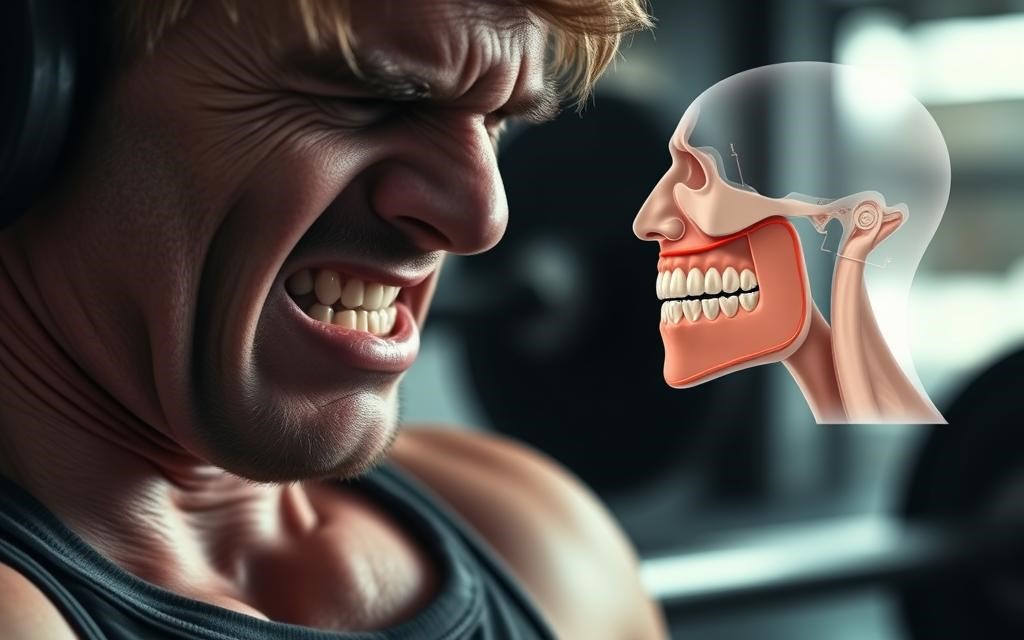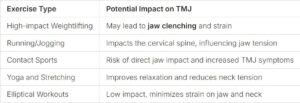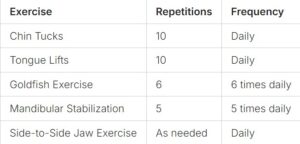Can Weight Lifting Cause TMJ?
Exploring fitness and weight lifting is exciting, but it’s important to think about your jaw health. TMJ disorders can be a concern. Exercise is good for you, but bad habits during workouts can harm your jaw. Weight lifting itself doesn’t cause TMJ, but jaw stress and clenching can make problems worse.
This section will help you understand TMJ, its symptoms, and how exercise affects your jaw. It’s key to know how to protect your jaw while lifting weights.
Key Takeaways
- Understanding TMJ is crucial for those engaging in weight lifting and other exercises.
- Jaw clenching during workouts can worsen TMJ symptoms.
- Good posture while lifting weights can help protect jaw health.
- TMJ flare-ups may resolve with proper care and gentle exercise.
- Regular exercise is vital to combat sedentary lifestyles prevalent in many adults.
Understanding TMJ Disorder
The temporomandibular joint (TMJ) connects your jawbone to your skull. Dysfunction here leads to TMJ disorder. This can cause jaw pain and discomfort.
What is TMJ?
TMJ disorder affects the jaw and skull area, causing pain and dysfunction. It can be caused by misalignment, stress, or injury. This can disrupt your daily activities, especially if you’re active.
Common Symptoms of TMJ Disorders
Knowing the symptoms of TMJ disorder is key to getting treatment. Common signs include:
- Jaw pain or tenderness
- Frequent headaches
- Earaches and ringing in the ears
- Difficulties while chewing
These symptoms can affect your daily life a lot. They can make eating, speaking, and sleeping hard. Many people feel more stressed because of the pain.
How TMJ Impacts Your Daily Life
TMJ disorder can really change your daily life. It can make eating hard or make it hard to focus because of pain. Some people change their activities or avoid certain foods to avoid pain.
Getting help early from experts like neuromuscular dentists is important. They can help manage TMJ disorder well.

Can Weight Lifting Cause TMJ?
Looking into the link between weight lifting and TMJ pain shows us how certain actions can harm our jaw. While working out is good, some behaviors during exercise can make jaw problems worse.
The Role of Jaw Clenching During Exercise
Many people clench their jaws when they lift weights hard. This is a natural way to help stabilize or focus. But, it can also be risky.
Trying to lift more can make you grind your teeth, hurting your teeth and jaw. This usually happens when you lift too much or don’t lift right. Keeping a balanced bite helps your jaw muscles work well, spreading out the force of lifting. Without this balance, you might face TMJ pain and other problems.
Impact of Improper Form on Jaw Health
Bad exercise form can hurt you in many ways, including TMJ issues. Lifting weights with the wrong posture can strain your neck and jaw, causing pain and tension in the TMJ. Doing exercises like overhead lifts or sit-ups wrong can make these problems worse.
It’s key to lift correctly to avoid TMJ pain and prevent tooth damage from clenching too much.
The Connection Between Exercise and Jaw Pain
Exercise is key for staying healthy, but some exercise types can cause jaw pain. This is especially true for people with TMJ disorders. Knowing which activities might make jaw pain worse can help you choose better.
Types of Exercises that May Aggravate TMJ
Some exercise types can make TMJ symptoms worse. For example, doing heavy weightlifting without the right form can put too much strain on the jaw. Here are a few exercises to watch out for:
- Heavy weightlifting, especially overhead lifts, may induce clenching.
- Jumping or running can create jolts that travel up the spine, influencing jaw tension.
- Contact sports where the jaw might endure direct impact could exacerbate symptoms.
How Neck and Jaw Ongoing Issues Relate
The link between neck issues and jaw pain is complex. Many with TMJ disorders also have neck tension. This can start a cycle where neck problems make TMJ symptoms worse. Keeping your neck healthy is important for your jaw’s function. If you have neck pain, remember these points:
- Neck tension can increase muscle strain in the jaw.
- Issues in neck alignment can affect how the jaw operates.
- Headaches associated with neck problems often coincide with TMJ symptoms.
Doing gentle activities like yoga or using an elliptical machine can help. These activities can reduce impacts on both the jaw and neck. This might lower the chance of jaw pain or worsening TMJ aggravation.
Managing TMJ Pain During Workouts
To manage TMJ pain during workouts, you need to correct your exercise posture, relax your jaw, and know when to get professional help. Each step is important for keeping your jaw healthy and reducing pain during exercise.
Correcting Exercise Posture
Proper exercise posture is key for TMJ management. Bad posture can strain your jaw muscles, making pain worse. Here are some tips:
- Keep your head aligned with your spine.
- Avoid bending or twisting your neck too much, as it can tighten your jaw muscles.
- Engage your core to help stabilize your body during lifts.
Changing your exercise posture can help reduce jaw tension.
Relaxation Techniques for Your Jaw
Adding jaw relaxation methods to your routine can make workouts more comfortable. Try these:
- Gentle jaw stretches to relieve tension.
- Mindful breathing exercises to promote relaxation.
- Physical therapy exercises like the Goldfish Exercise and Tongue Up Exercise, focusing on jaw alignment and muscle strength. Do each exercise as recommended, like the Goldfish Exercise six times a day.
These methods not only relax your jaw but also strengthen the muscles that support jaw mobility.
When to Seek Professional Help
Knowing when to seek professional help is crucial for TMJ issues. Look out for these signs:
- Persistent jaw pain or tenderness.
- Frequent headaches or migraines.
- Clicking or popping noises while eating or speaking.
Seeing a TMJ specialist can help create a treatment plan for your specific symptoms. Early treatment can prevent more discomfort and improve your life quality.
Conclusion
The link between weight lifting and TMJ awareness is key for good jaw health. Many people, including athletes, face Temporomandibular Dysfunction (TMD) symptoms. This is especially true for both competitive and recreational athletes.
It’s important to watch your form while lifting weights and avoid jaw clenching. Simple relaxation methods can help prevent TMJ problems. Knowing how exercise affects your jaw can help you stay healthy.
If you have ongoing pain or discomfort, see a healthcare expert. Fixing TMJ issues can greatly improve your life and your performance in sports and exercise.
FAQ
What is TMJ and how does it affect my jaw health?
TMJ stands for temporomandibular joint. It’s the hinge that connects your jaw to your skull. TMJ disorders, or TMD, can cause pain or dysfunction. This can lead to jaw pain, headaches, earaches, and trouble chewing.
What are the common symptoms associated with TMJ disorders?
TMJ disorders can cause jaw pain, headaches, and earaches. You might also hear clicking or popping sounds when moving your jaw. Chewing can become difficult, affecting your daily life.
Can weight lifting contribute to TMJ pain?
Weight lifting itself might not cause TMJ disorders. But, it can make jaw pain worse if you clench your jaw or use bad form during exercises.
How does jaw clenching during heavy lifts affect TMJ?
Clenching your jaw during heavy lifting strains the jaw muscles. This can lead to misalignment and increased tension in the TMJ area. It might make TMD symptoms worse.
Are there specific exercises that may worsen my TMJ symptoms?
Yes, high-impact exercises and certain weightlifting movements can make TMJ symptoms worse. Especially overhead lifting. Activities that strain both the neck and jaw should be done carefully.
How is the health of my neck related to TMJ issues?
The health of your cervical spine is key to jaw function. Neck tension or misalignment can contribute to or worsen TMJ symptoms. Keeping your neck healthy is important during physical activities.
What steps can I take to manage TMJ pain while exercising?
To avoid jaw strain, correct your exercise posture. Also, try gentle jaw stretches and mindful breathing. These can help reduce TMJ pain during workouts.
When should I seek professional help for my TMJ symptoms?
If you have persistent symptoms like severe jaw pain, frequent headaches, or jaw clicking, see a TMJ specialist. They can create a treatment plan tailored to your needs.



